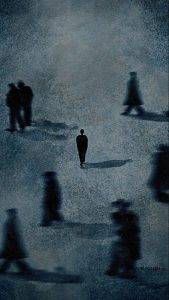The point here is: a rejection is the end of something that doesn’t work, you have to accept it, make amends and collect yourself. It is painful. God, yes, it is painful. You don’t know how to deal with it, and you wonder if you will ever be good enough to achieve a certain goal or complete a certain task.
Whether you are looking for approval or the certainty of something, the key thing to understand is to start with rejection and work on improvement.
It’s a real dream.
But from what was it born?
From a need.
That’s how our desires are born, from a need.
My need was born from a limitation: I could not improve on the guitar.
Now I tell you this story, which is not only personal but of all those who have overcome their limits with commitment.
My mother always tried to steer me towards an activity. First, it was karate, then kung fu, then football, and finally, out of desperation, she enrolled me in a local guitar course since I was giving up early or getting tired.
I was 13 years old.
I had a classic guitar, not a very fine one.
I took lessons for six months and then abandoned the guitar.
In high school, however, I met some friends who were interested in forming a band, so I took up the guitar again and started to learn the first songs, which were Knockin’ On Heaven’s Door performed by Guns N‘ Roses (I know, the original was by Bob Dylan, but we liked the rockier version), Oasis and other bands with the same chords progression over and over again.
For the whole summer, we rehearsed between my garage and a rehearsal room outside our suburb, exactly in Milan.
The issue?
Nothing, except that they were improving at lightning speed and I wasn’t.
I couldn’t take the extra step, I was stuck. I could rehash the same four chords, but I couldn’t go any further to get into a kind of essential, melodic complexity.
I remember that Sinbad (like Edmon Dantès in Dumas’ Count of Monte Cristo), the drummer, after a few weeks was already able to play easily System of a Down’s chop suey, either on a real drum kit in the recording room or tapping his feet without the help of drumsticks. A truly gifted human being, trust me.
Wilmore (another alter ego of the protagonist of the aforementioned novel), on the other hand, played bass guitar and sang while managing to do so with fluidity.
In short, they were getting good and I was falling behind. So much so that a few months later we met another guitarist, the same age as us (I think he was a year younger), who decreed my exit from the band.
I had been kicked out by my friends and schoolmates with whom I had started the band.
It was a hard blow.
At 16, believe me, the rejection and the shame of not living up to someone or something is a terrible drama.
I was discouraged. Angry. Frustrated. All I could think about was the outrage I had suffered, the shame was devouring me, and I just wanted to explode.
Of course, I don’t remember all the steps I went through during that time, in short, I can say two things. The first is that I started another band with a very dear friend from school, a punk rock band, playing Offspring, Green Day and the like. The second thing is that one day, when I was sixteen, I decided to buy Metallica tabs, which at the time, for us, were the most popular and coolest band alive. I convinced myself that if I learned to play Metallica, I would be recognised as a great guitar player and my old friends would take me back into the band.
In fact, that’s what happened.
I went to Milan, there was a place called Ricordi, and bought a book of the best Metallica songs, from Master of Puppets to Enter Sandman, and learned them all, including solos.
Of course, while hiding myself and learning the songs, I started taking guitar lessons again, but this time at a small music school which, years later, would become a big music school, but we’ll come back to that later.
The music school, called Music Talent (but it had another name) taught singing, and musical instruments such as drums, bass and of course guitar. In the beginning, there was only one guitar teacher, which was the turning point for me. He introduced me to a new way of seeing music, as well as introducing me to bands like Dream Theater, who clearly outclassed Metallica in both technique and composition. For me, however, Metallica, at least for that first year, still represented a yardstick for letting my friends know that I was on their level and that they could take me back into the band.
I also made a mistake.
Although this frustration of mine had led me to become good, it had clouded my judgement, so much so that when my old band decided to take me back, I abandoned my new friends first in secret and then, once the betrayal was discovered, openly.
Not a nice behaviour.
My dedication to becoming good had created a separation from the world, I had distanced myself from the soul of things, including friendship. Luckily for me, I was able to keep all my friendships and maintain a bond that would last to this day. Thank you Busoni (another alter ego of Dantès) for understanding that I was immature and that I did not want to hurt you, as the time we spent together playing Offspring and Green Day, was one of the best times of my life.
Shortening the story.
With the discovery of Dream Theater (and other bands of similar calibre), the dice were about to turn.
We played in various competitions and tours with this band, and we had a good time.
I, however, was becoming much better than anyone would have expected. So much so that, between the ages of 17 and 18, the chairwoman of the music school where I was taking lessons (which by then had made a name for itself and had more than one location around Milan), asked me to take the place of another guitar teacher (there were three and I was to be the third) to teach beginners and intermediates.
I was reluctant to accept. I was still in school and my grades were not good. She insisted for a while and I finally accepted. After a month, however, I had to tell her that between school, band rehearsals and family commitments, I wasn’t capable of being a teacher as well. Because, you know, teaching means studying together with your pupils. And my students were demanding. They would ask me to learn this song, to show them Eddie Van Halen’s tapping, and things like that. I couldn’t keep up with them.
To this day, I kind of regret not continuing, but what can I do? It seemed like a huge task at the time. And although I learned a song quickly, including solos, I felt like the effort was tearing me apart.
Besides, it has to be said, teaching is an art. I was a bit dumb and absent-minded at 17. I was quickly learning scales, arpeggios and more, but I wasn’t applying myself to theory as much as I should have. I would look at a piece of music and learn it. That seemed to me to be enough. I would look at a talented guitarist, and immediately be able to reproduce their speed.
I was hungry.
When I met the singer of what was to become the most important band of those years, I immediately knew that I had to create a new one with him. Dantès (as I called this new singer) possessed a portentous voice, he could sing Freddie Mercury and imitate Micheal Jackson almost to perfection.
We started collaborating and after a few months, I left Wilmor and Sinbad for that new adventure.
Actually, Sinbad, the drummer, came with me, united by a passion for Dream Theater. In the rehearsal room, sometimes we would rehearse Dream Theater songs, we would mix riffs to create an intro to perform live, and usually people would be amazed. Our intros were crazy, considering our age.
Nowadays, with the explosion of talents on YT, we might look like one of many, but back then, at the end of the ’90s and in the early 2000s, there were very few like us. And we learned everything by ear, or by reading tablatures with transcriptions of solos or riffs, there were no tutorials or masters who could teach you such intricacies. Let me explain, there certainly was someone, but we never got in touch with them. We felt unique and kept improving exponentially.
Until, everything fell apart, but that’s another story.
My career as a musician soon ended. It went from the age of 14 to 24 years old, although the last two were more like a long torment, a dragging out of something that was already broken, that no longer worked.
Because in addition to talent, you need cohesion and trust in a band. We had talent, but we lacked cohesion and trust.
The point here is: a rejection is the end of something that doesn’t work, you have to accept it, make amends and collect yourself. It is painful. God, yes, it is painful. You don’t know how to deal with it, and you wonder if you will ever be good enough to achieve a certain goal or complete a certain task.
Whether you are looking for approval or the certainty of something, the key thing to understand is to start with rejection and work on improvement. In my case, it was to become a good guitar player, and I became a Guitar Master. I started from there, by recognising my fallibility, looked up and set myself the goal of learning the best Metallica songs so that no one could question my talent any more.
This, however, was not enough. In fact, my attitude hurt other people, and although I managed to make up for it, if I went back I would do things more gently.
If a girl has left you, or a boy, or whoever you want, you certainly don’t have to do everything to get your loved one back, what you have to do is get fit, eat better, become more interesting, attentive and a smart person, so you will attract better people. Whoever leaves you, you have to let them go. If they come back, they must come back because of their own decision that has nothing to do with your ridiculous insistence. I will tell you a story about that… next time.
See you soon.
These in the video are some of the members of my last band, but more than twenty years later.


